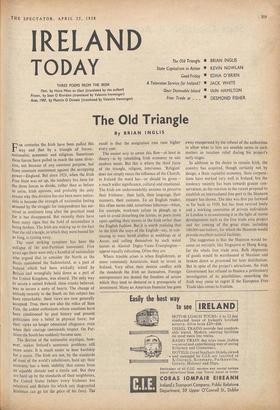IRELAND
TODAY
THREE POEMS FROM THE IRISH
Finit, by Maire Mhac an tSaoi (translated by the author) Frozen, by Sean 0 Riordain (translated by Valentin Iremonger) Aran, 1947, by Mairtin 0 Direain (translated by Valentin Iremonger) The Old Triangle State Capitalism in Action Good Friday A Television Service for Ireland? Dear Damnable Island Free Trade or . . .
• BRIAN INGLIS • KEVIN NOWLAN • EDNA O'BRIEN • JACK WHITE • IAIN HAMILTON • DESMOND FISHER
The Old Triangle
By BRIAN INGLIS
FOR centuries the Irish have been pulled this way and that by a triangle of forces : nationalist, economic and religious. Sometimes these forces have pulled in much the same direc- tion, not because of any common purpose, but from common resentment against the occupying Power—England. But since 1921, when the Irish Free State was set up, the tendency has been for the three forces to divide, rather than as before to unite, Irish opinion; and probably the only reason why this division has not been more notice- able is because the strength of nationalist feeling aroused by the struggle for independence has sur- vived in sentiment long after the practical need for it has disappeared. But recently there have been many signs that the hold of nationalism is being broken. The Irish are waking up to the fact that the old triangle, to which they were bound for so long, is rusting away.
The most striking symptom has been the collapse of the anti-Partition movement. Five years ago there were only a handful of nationalists who argued that to consider the North as the Nazis considered the Sudetenland, as a part of Ireland which had been wickedly seized by Britain and wrongfully held down as a part of the United Kingdom, was absurd. The only way to secure a united Ireland, these cranks believed, was to secure a unity of hearts. The change of attitude recently in the South on this subject has been remarkable; these views are now generally accepted. True, there are also the relics of Sinn Fein, the ardent enthusiasts whose emotions have been conditioned by past history and present politicians into a belief in physical force; but their views no longer command allegiance, even when their courage commands respect. On Par- tition the South has suddenly become sane.
The decline of the nationalist mystique, how- ever, makes Ireland's economic problems still more acute. It is much easier to bear hardship for a cause. The Irish are not, by the standards of most of the world's inhabitants, hard up; their economy, has a basic stability that comes from an equable climate and a fertile soil. But they are hard up by the standards of their neighbours, the United States (where every Irishman has relatives) and Britain (to Which any disgruntled Irishman can go for the price of his fare). The result is that the emigration rate runs higher every year.
The easiest way to arrest this flow—at least in theory—is by rebuilding Irish economy to suit modern needs. But this is where the third force of the triangle, religion, intervenes. 'Religion' does not simply mean the influence of the Church; in Ireland the word has—or should be given— a much wider significance, cultural and emotional. The Irish are understandably anxious to preserve their Irishness ; their faith, their language, their manners, their customs. To an English reader, this often seems odd, sometimes hilarious—when, for example, workmen refuse to plough up a rath to avoid disturbing the fairies; or poets insist upon spelling their names in the Irish rather than the English fashion. But it is worth realising that to the Irish the ways of the English—say, iircon- tinuing to wear hired clothes at weddings or at Ascot; and calling themselves by such weird names as Alastair Digby-Vaine-Trumpington- appear equally ridiculous. Often they are.
Where trouble arises is when Englishmen, or more commonly Americans, want to invest in Ireland. Very often their desires conflict with the standards the Irish set themselves. Foreign entrepreneurs are denied the freedom of action which they tend to demand as a prerequisite of investment. Many an American financier has gone away exasperated by the refusal of the authorities to allow what to him are sensible terms in such matters as taxation relief during his project's early stages.
In addition to the desire to remain Irish, the country has acquired, though certainly not by design, a State capitalist economy. State corpora- tions have worked very well in Ireland; but the tendency recently has been towards greater con- servatism, as the reaction to the recent proposal to establish an international free port in the Shannon estuary has shown. The idea was first put forward as far back as 1930, but has been revived lately and a working committee of private individuals in London is re-examining it in the light of recent developments such as the free trade area project and the coming of the great ships, including 100,000-ton tankers, for which the Shannon would provide excellent natural facilities.
The suggestion is that the Shannon would be- come an entrepot, like Singapore or Hong Kong, for the whole free trade area. Bulk shipments of goods would be warehoused at Shannon and broken down or processed for later distribution. But in spite of the project's attractions, the Irish Government has refused to finance a preliminary investigation of its possibilities; something the Irish may come to regret if the European Free Trade idea comes to fruition.














































 Previous page
Previous page